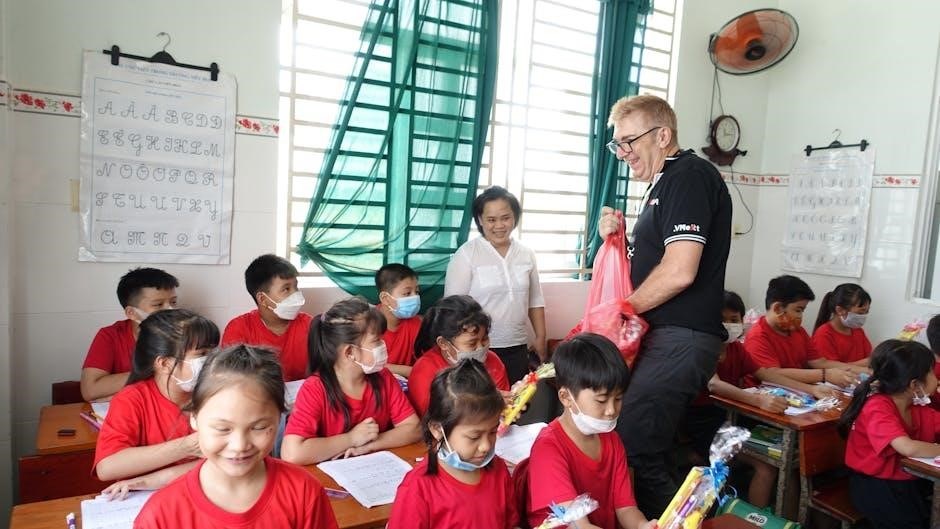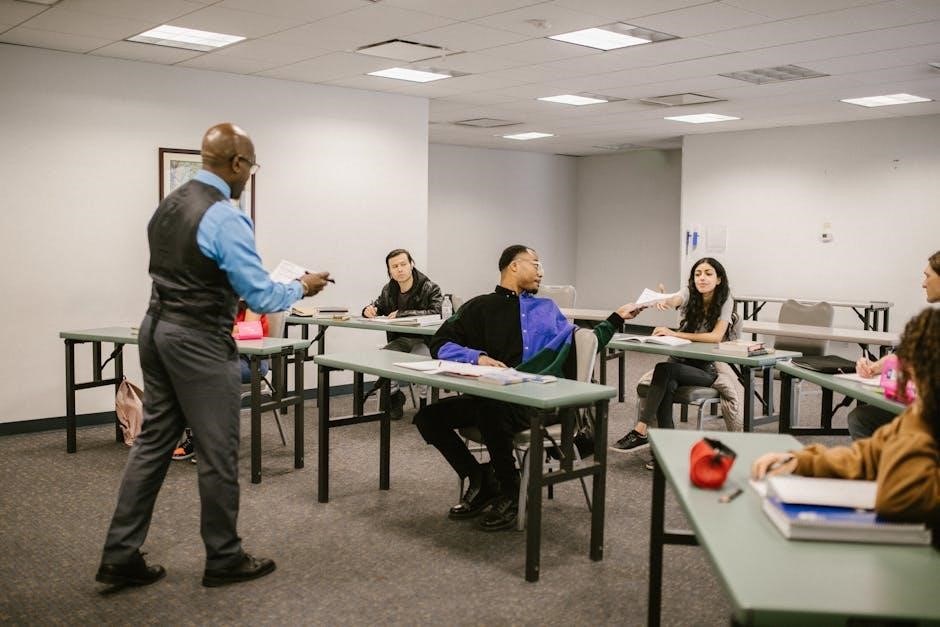Catholic education emphasizes spiritual growth, academic excellence, and moral development, fostering a faith-based environment where students develop compassion, integrity, and respect for others, guided by Gospel values․
Understanding the Core Values of Catholic Schools
Catholic schools are rooted in a faith-based philosophy that emphasizes holistic education, blending spiritual, academic, and moral development․ Core values include fostering a strong relationship with God, promoting social justice, and encouraging service to others․ These institutions prioritize creating a nurturing environment where students grow in faith, integrity, and compassion․ The curriculum is designed to integrate Gospel values, helping students develop a moral framework that guides their decisions and actions․ Community and prayer are integral parts of daily life, reinforcing the belief in the dignity of every individual․ By instilling these values, Catholic schools aim to inspire students to become responsible, empathetic, and faith-driven leaders in society․
The Role of Faith in Academic Instruction
Faith is the cornerstone of Catholic education, seamlessly integrated into all academic subjects to foster a deeper understanding of God’s creation․ Teachers are expected to inspire students to see the world through the lens of faith, emphasizing moral values and ethical decision-making․ Religion is not just a subject but a foundation for learning, guiding how students approach math, science, literature, and other disciplines․ This holistic approach helps students develop a sense of purpose and responsibility, encouraging them to live out their faith in daily life․ By connecting faith with academics, Catholic schools aim to nurture well-rounded individuals who embody compassion, integrity, and a commitment to serving others․
Key Qualities Sought in a 3rd Grade Catholic School Teacher
Catholic schools seek teachers who embody faith commitment, integrate spirituality into lessons, demonstrate strong classroom management, and foster student engagement while nurturing academic and moral growth․
Commitment to Catholic Values and Mission
A Catholic school teacher must deeply embody and promote the values of the Catholic faith, ensuring they align with the school’s mission․ This includes fostering a Christ-centered environment, integrating faith into daily interactions, and modeling virtuous behavior․ The teacher should demonstrate a personal commitment to Catholic teachings and actively contribute to the spiritual development of students․ Understanding and supporting the school’s mission statement is essential, as well as being willing to participate in religious activities and liturgies․ The ability to collaborate with colleagues and the parish community to uphold Catholic identity further highlights this commitment, creating a unified and faith-driven educational setting for students․
Ability to Integrate Faith into Curriculum
Teachers in Catholic schools are expected to seamlessly integrate faith into academic lessons, enriching students’ spiritual and intellectual growth․ This involves connecting religious teachings to subjects like math, reading, and science, emphasizing moral values and a Catholic worldview․ For instance, discussing stewardship during science lessons or exploring biblical themes in literature․ The ability to prayerfully reflect on curriculum content and encourage students to see God’s presence in all areas of life is essential․ This approach fosters a holistic education, helping students develop a strong faith foundation while meeting academic standards, and preparing them to live as compassionate, faith-driven individuals in the world․
Classroom Management and Student Engagement Strategies
Effective classroom management in a Catholic school involves creating a structured, respectful environment that fosters academic focus and spiritual growth․ Teachers should establish clear expectations, promote positive behavior, and encourage student responsibility․ Engaging strategies might include differentiated instruction, hands-on activities, and technology integration to cater to diverse learning styles․ Building strong relationships with students and parents is crucial for maintaining a supportive atmosphere․ Teachers should also incorporate faith-based values, such as empathy and kindness, into daily interactions․ By balancing discipline with compassion, educators can create a classroom culture that prioritizes both learning and character development, reflecting the Catholic mission of holistic education․

Common Interview Questions for Catholic School Teachers
Catholic school interviews often focus on commitment to faith-based education, teaching philosophy, classroom management, and strategies for integrating spiritual values into academic instruction while fostering student growth․
General Teaching Philosophy and Approach
A Catholic school teacher’s philosophy often centers on fostering a faith-based, student-centered environment that nurtures academic, spiritual, and emotional growth․ Emphasizing the integration of Gospel values, teachers strive to create a welcoming, inclusive classroom where students feel supported to reach their full potential․ The approach typically involves differentiated instruction, active engagement, and a focus on moral development․ Teachers are expected to model Christ-like behavior, promote social responsibility, and encourage critical thinking while maintaining high academic standards․ This philosophy is rooted in the belief that education is a sacred mission to help students become compassionate, morally grounded individuals who contribute positively to society․
Classroom Management Techniques
Catholic school teachers often emphasize creating a respectful, structured, and faith-based classroom environment․ Techniques include setting clear expectations, using positive reinforcement, and encouraging student responsibility․ Modeling Christian values, such as kindness and empathy, helps foster a positive atmosphere․ Teachers may incorporate prayer and reflection to guide behavior and decision-making․ Consistency, active supervision, and restorative practices are also key strategies to address challenges and promote social-emotional growth․ By integrating faith into management practices, educators help students develop self-discipline and a sense of community, aligning with the Catholic mission of holistic education․
Methods for Integrating Religion into Daily Lessons
Catholic educators often integrate faith into lessons by starting with prayer, linking academic concepts to Gospel values, and using religious stories or saints as examples․ Teachers encourage students to reflect on how their actions align with Catholic teachings․ Religion is woven into subjects like reading, history, and science, emphasizing moral and ethical decision-making․ For instance, discussing stewardship during environmental lessons or exploring biblical values in literature․ This approach fosters a faith-centered learning environment, helping students connect their spiritual growth with academic development and fostering a sense of purpose and responsibility rooted in Catholic values․

Behavioral and Scenario-Based Questions
These questions assess how teachers handle real classroom challenges, such as managing disruptions or addressing conflicts, while promoting a positive, faith-centered environment and student well-being․
Handling Challenging Student Behaviors
Addressing challenging behaviors in a Catholic school classroom requires patience, empathy, and faith-based values․ Teachers should focus on creating a supportive environment, setting clear expectations, and using positive reinforcement to encourage good behavior․ When conflicts arise, active listening and problem-solving strategies can help resolve issues while teaching students accountability and respect․ Redirecting inappropriate behavior with constructive feedback and offering individual support when needed fosters a sense of dignity and understanding․ Collaborating with colleagues and parents to develop consistent approaches ensures a unified and compassionate response to behavioral challenges․
Building a Positive Classroom Environment
Creating a positive classroom environment in a Catholic school involves fostering mutual respect, responsibility, and faith-based values․ Teachers should encourage open communication, active listening, and empathy among students․ Incorporating prayer and faith into daily routines helps cultivate a sense of community and shared purpose․ Promoting collaborative activities and teamwork builds unity, while recognizing individual strengths and talents enhances self-esteem․ Establishing clear expectations and positive reinforcement encourages responsible behavior․ By integrating Catholic values into daily interactions, teachers create a nurturing space where students feel valued, supported, and inspired to grow academically, spiritually, and socially․
Collaborating with Parents and Colleagues
Effective collaboration with parents and colleagues is vital in Catholic education․ Teachers should maintain open communication with parents through regular updates, meetings, and volunteer opportunities․ Building trust and partnerships ensures students receive consistent support at home and in school․ Working with colleagues involves sharing resources, planning lessons, and participating in professional development to align teaching strategies․ Prayer and shared faith values strengthen teamwork, fostering a united commitment to student growth․ By collaborating, teachers create a cohesive environment that nurtures students’ academic, spiritual, and personal development, reflecting the Catholic mission of community and service․

Academic and Subject-Specific Questions
Interviews may include questions about teaching strategies for math, reading, science, and social studies, as well as integrating Catholic values into these subjects effectively․
Teaching Strategies for Math and Reading
Teachers may be asked about their approaches to math and reading instruction, such as using phonics-based reading programs or hands-on math activities․ They should emphasize how they make lessons engaging and tailored to student needs․ Incorporating technology, group work, and individualized instruction are key strategies․ The ability to differentiate instruction and use assessments to guide teaching decisions is also important․ Aligning these strategies with Catholic values, such as fostering critical thinking and compassion, is essential․ Candidates should be prepared to provide specific examples of successful methods they’ve employed in the classroom․
Science and Social Studies from a Catholic Perspective
Catholic schools integrate faith into science and social studies to help students understand God’s creation and humanity’s role in the world․ Teachers emphasize the wonder of God’s design in science and the moral dimensions of historical events․ They encourage critical thinking and ethical decision-making, aligning lessons with Catholic teachings․ For example, science lessons might highlight stewardship of the Earth, while social studies could focus on justice and compassion in historical contexts․ This approach fosters a holistic education, blending academic rigor with spiritual and moral formation, preparing students to contribute positively to society․

Spiritual Leadership and Community Involvement
Catholic school teachers model faith, lead prayer, and engage in community service, fostering a sense of unity and social responsibility among students and the broader community․
Leading Prayer and Religious Activities
In Catholic schools, teachers are often expected to lead students in prayer and religious activities, fostering a strong spiritual foundation․ This may include beginning the day with morning prayer, reciting grace before meals, or leading class reflections․ Teachers should be comfortable integrating faith into daily routines and creating opportunities for spiritual growth․ They may also be asked to lead or participate in school Masses, prayer services, or retreats․ The ability to model a life of faith and inspire students to deepen their relationship with God is essential․ Engaging students in meaningful religious experiences helps build a faith-filled community․
Participating in School Liturgies and Events
In Catholic schools, teachers are often expected to actively participate in school liturgies, Masses, and faith-based events, fostering a strong sense of community and spiritual identity․ This includes attending and assisting with school-wide Masses, prayer services, and religious celebrations․ Teachers may also be asked to help organize or lead these events, ensuring they align with the school’s mission and values․ Participating in such activities not only supports the students’ spiritual growth but also models a life of faith and service․ Engaging in these communal practices strengthens the school’s Catholic identity and creates a nurturing environment for all members of the school community․
Preparing for the Interview
Researching the school’s mission, practicing responses to common questions, and organizing materials are key steps in preparing for a Catholic school teaching interview․ Understanding the school’s values and aligning your teaching philosophy with their Catholic education approach ensures a confident and focused presentation․
Researching the School and Its Mission
Understanding the school’s mission and values is crucial for a successful interview․ Visit the school’s website to review their philosophy, annual reports, and strategic plans․ Familiarize yourself with their curriculum, extracurricular activities, and community involvement․ Identify how their Catholic identity shapes their educational approach․ Note any unique programs or traditions that reflect their commitment to faith and academics․ This research enables you to align your teaching philosophy with their goals, demonstrating your enthusiasm for their specific mission․ Additionally, understanding their challenges and strengths can help you tailor your responses to show how you can contribute meaningfully․
Practicing Responses to Common Questions
Preparing thoughtful responses to common interview questions is essential for a successful Catholic school teaching interview․ Review potential questions about your teaching philosophy, classroom management, and faith integration․ Practice articulating your commitment to Catholic values and how you incorporate them into lessons․ Use specific examples from your experience to demonstrate your approach․ Consider role-playing with a friend or recording yourself to refine your delivery․ Focus on being concise, sincere, and aligned with the school’s mission․ This preparation will help you confidently convey your qualifications and enthusiasm for the role, ensuring your responses resonate with the interviewer․

